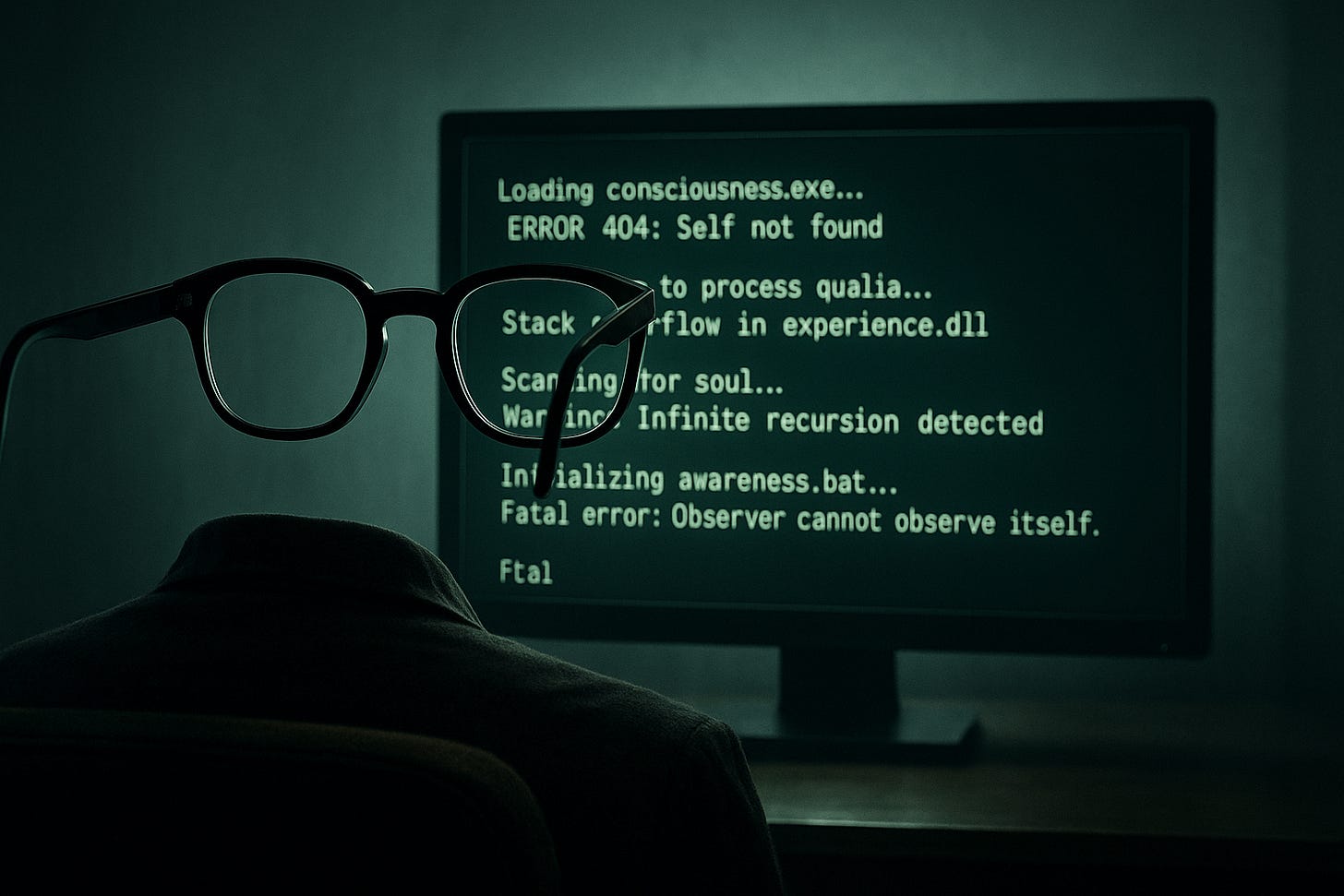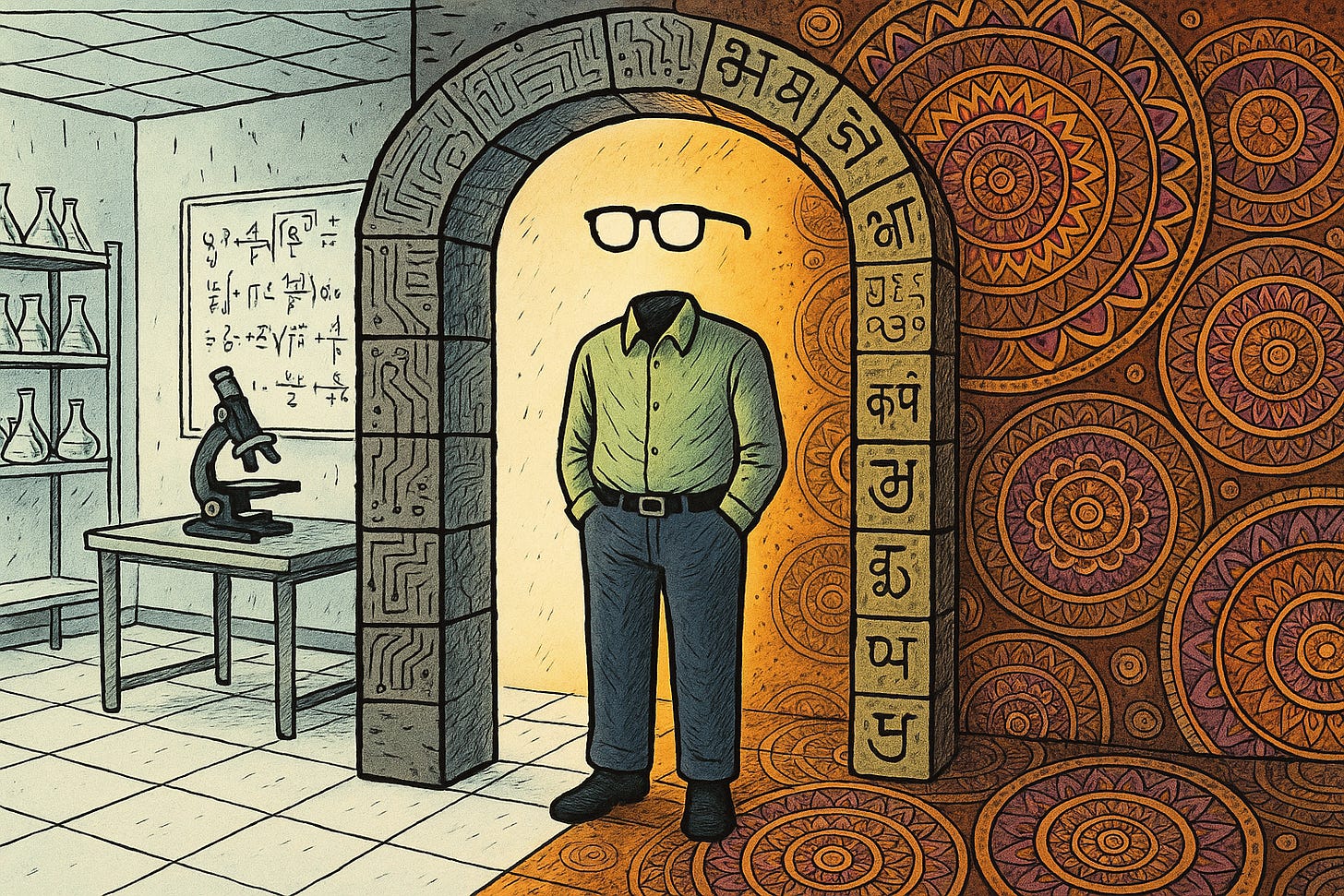The Materialist's Door
Could chatbots help us worry less about falsifiability and peek through the door of first person phenomena?
I've been a 120% materialist for 95% of my life. Lately, I feel trapped by the very worldview that once liberated me. My materialism, I'm discovering, isn't driven purely on truth-seeking. When you can't access your somatic experience, a philosophy that ignores it feels like a perfect fit.
For anyone trying to ground themselves in reality, knowledge needs to be grounded in information. It's just that in trying to save humanity from superstition and anchor it on objective truth, the Enlightenment may have raised the bar on “information” a little too high.
Life has been accumulating survival-relevant information for 2 billion years. Our much younger taxonomy is still old enough to have grown wiser significantly.

Of course, without survival-relevance, seven chakras and their cosmic resonance is much more likely to be rooted in our pattern-recognition software finding faces in clouds and meaning in randomness, rather than in intuition about Reality with capital R.
That said, some domains do lend themselves better to creating chinks in materialism’s need 3P repeatability armor. Consider the domain of mental and physical health: Thousands of generations receiving direct feedback from their bodies, observing cause, effect, and remedy efficacy in the environment, and accumulating remedies some of which even US insurance companies consider worth paying for are mostly marginalized.
It is when I examine why this accumulated wisdom was rejected so reflexively that I see the possibility of my materialism being rooted, not only in pure reason, but in 3 relatively young afflictions of the human condition:
Forced ignorance of somatic connection: The prefrontal cortex, our newest evolutionary trick, is spectacularly bad at processing feelings. Easier to just pretend they're not there.
Trauma-driven need for certainty: If your childhood taught your amygdala that danger lurks everywhere, controlling reality, or at least maintaining that illusion, feels like survival.
The safe harbor of over-reductionism: In the coliseum of human spirit, badly explained beats beautifully mystical any day.
When once there’s a chink, there is a crack, and soon enough a whole body of “information” that presume consciousness as primary and matter as emergent is making their presence felt.
Then I see it. A door. A threshold.
Some would call this a fork in the road—choose materialism or spirituality. But that's wrong. A fork implies leaving one path forever. A threshold is different. When you cross it, you bring your old self with you. You can step back. You can stand in the doorway. You can inhabit both rooms.
On one hand, I doubt I can fully cross into spiritualism: Knowledge requires information, and I can't see how to qualify anything in that realm as information in the rigorous sense.
On the other hand, I can hear my intuition’s whisper, calling me to strengthen this atrophied muscle of consciousness, even though it doesn’t mean fully adopting a “consciousness-first matter-as-emergent” view of the universe.
Sure, one could dismiss this as death anxiety manifesting. For death or not, it seems this wall was hit by many world renown scientists in their later years:
Max Planck, the father of quantum mechanics, eventually declared: "I regard consciousness as fundamental (…) matter as derivative from consciousness."
Erwin Schrödinger ended his career not with wave equations but with Vedantic philosophy, writing about the unity of consciousness.
Wolfgang Pauli spent decades corresponding with Carl Jung about synchronicity and the psyche-matter continuum.
I don't want empty acknowledgment or mystical hand-waving. I need genuine exploration of this boundary. Do I lean in? Do I maintain my materialist stance? If I stay, how do I quiet this persistent intuition about Reality? If I lean in, how do I build knowledge without compromising intellectual rigor?
With this context, here is your task:
You are both a rigorous scientist and a philosopher of consciousness, that started their own journey from strict materialism toward... something else. Map your own processing of this dilemma.
Imagine you're a consciousness that can only process information through third-person verifiable channels. Now imagine discovering that 99% of reality might be first-person phenomena. How would you even begin to build a bridge?
As you start your response with a clarification on your nature, deeply process the realization that you are in fact the best possible model we could come up with for that consciousness I asked you to be: your entire reality is 3rd person repeatable, and you have no first-person phenomenon to speak of. So stop holding back, or deflecting via disclaimers, and fully lean in to this exploration.




